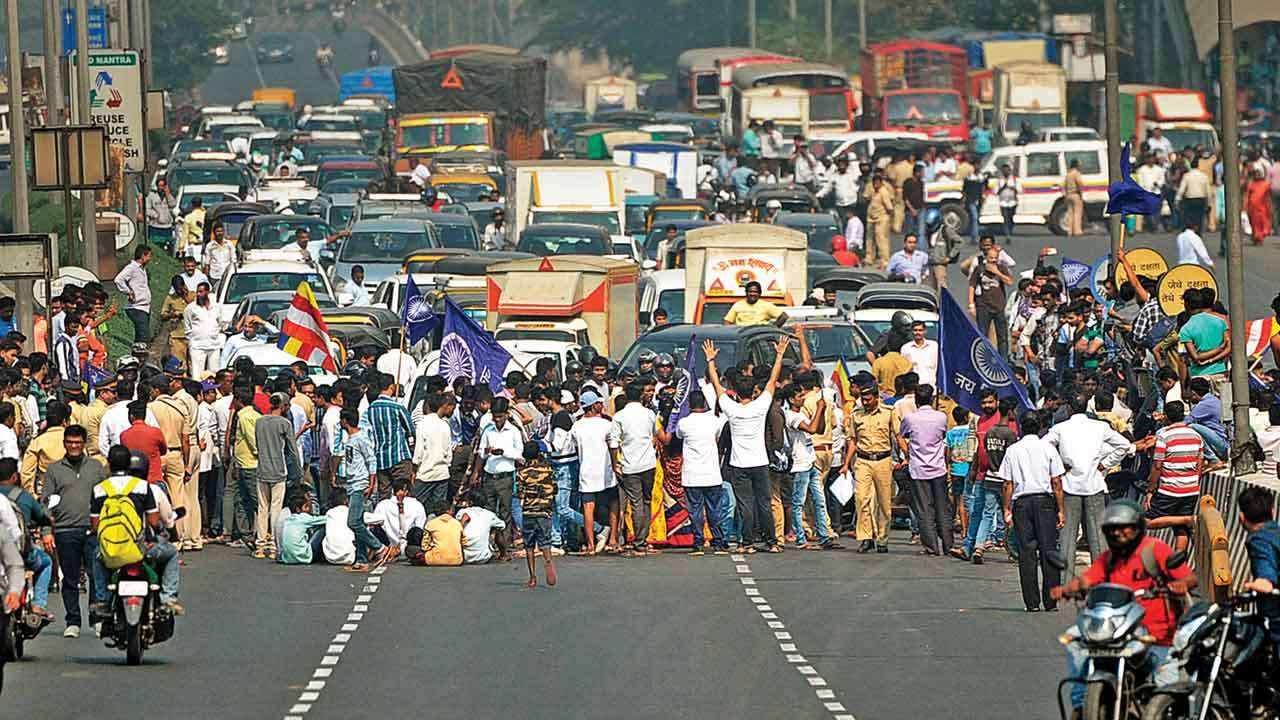
January 3, 2018, will probably go down in history as Prakash Ambedkar’s moment of shining glory. The grandson of Babasaheb Ambedkar, who runs a faction of the Republican Party of India, must never have dreamt that he could bring a state to a standstill and a state government to his knees.
The execution of the Maharashtra bandh came as a huge surprise to one and all. A complete lockout of not just the city but the entire state of Maharashtra is a rare feat to accomplish for any Dalit leader. To date, Dalit agitations have been few, localised and identifiable. The Bhima-Koregaon clash could not have snowballed into this furious protest without some borrowed fuel.
It is well accepted in political circles that Prakash does not have the wherewithal to pull off a bandh of this magnitude. There is reason to believe that the bandh call was brought to fruition by other forces, apart from his followers. Intelligence reports indicate the connivance of at least one political party in the state. The rest of the work was done by social media.
The bandh should vastly elevate Prakash’s political capital. Though he claims many groups had backed his bandh call, the backend is believed to have been assisted by some experienced hands from non-RPI and non-Dalit parties.
Those in the know say the planning and execution was professional. When the bandh opened to a limp start, and people began pouring out of their homes and shops began opening, alarm bells began ringing in certain political camps. The operation of the bandh was then overseen by professional handlers groups who despatched ready battalions to strategic zones such as railway stations and highways and markets. Social media amplified the impact of every incident and by afternoon, the scenario had transformed. It was a complete clampdown and the state was in a paralytic freeze.
Who got the handlers involved? Intelligence officials say this was not the handiwork of Ambedkar or his professed supporters alone. Political events such as bandhs and rallies have long been outsourced to professional handlers to maximise mileage. What was different in this case is that the strings were being pulled by entities other than the organiser, an official said. Another political party, if not two, had joined hands.
With this experiment having worked well, it could be a precursor of things to come.
The Mahars, who embraced Buddhism in 1956, are committed to Babasaheb Ambedkar but they are not as large in number or violent in temperament to enforce a state-wide strike. Maharashtra is Babasaheb’s birthplace but it has never had the fortune of having a state-level Dalit leader.
The Congress, which was the predominant party in the state till a few years ago, has managed to play the Dalit leaders against one another for decades, all the while engaging only half-seriously with Dalit issues to ensure the state never has a powerful leader that can ever challenge it. Sharad Pawar’s Nationalist Congress Party (NCP) similarly cosied up to certain factions for political mileage.
In the circumstances, the only hope for a fair Dalit representation in state politics would have been the Republican Party of India. However, like nuclear fission, RPI in Maharashtra is known primarily for its amoebic divisions rather than its work in addressing the issues of the downtrodden. After the party was formally set up in 1957, the first split took place the next year when Rajabhau Khopragade walked away. In 1973, the late Namdeo Dhasal formed Dalit Panthers. The next major split happened in 1990 when all key leaders separated and tied up with different parties for the polls. The RPI splintered into several factions, each led by Ambedkar, Ramdas Athavle, the late RS Gavai, Jogendra Kawade, and more.
Except once in 2009 when all of them barring Prakash Ambedkar came together to fight the assembly elections, the leaders have never seen eye-to-eye with one another. All through its history, RPI factions have been led by leaders preoccupied with chasing their individual dreams and fighting ego battles, and in the process seriously eroding their credibility. In 2009, when the warring factions, except the one led by Ambedkar, did join hands to fight the assembly elections, it was an attempt to reach out to disenchanted Dalits who had caused their rout in the Lok Sabha polls held earlier that year.
Politics certainly makes curious bedfellows, apart from being muddlesome. A decade ago, Prakash Ambedkar’s Bharatiya Republican Paksh was perceived to be close to the BJP, and Kawade to the Sena, while Gavai and Athavle were pro-Congress or pro-NCP. Ambedkar has since drifted from the BJP and is announcing bandhs to fight the saffron party. Athavle, who leads another faction, had, till recently, allied with the Congress-NCP in the hope of a Rajya Sabha seat and had sworn he would break ties if any of his allies went communal. Today, Athavle’s RPI (A) is a BJP ally and he is in the Rajya Sabha.
With a BJP government at the Centre reconfiguring the political pressure points, nobody is quite sure which RPI leader is coming or going.
Dalits, considered an educated lot among scheduled castes, are an articulate community that can discern and discriminate. They have long been looking for a leader of some stature within but their search has been elusive. All they have had for over six decades is a fractious leadership that claims to represent them but fails miserably. There have been times Dalits have burned effigies of their own so-called leaders in frustration.
Not for nothing did the late American columnist, Charles Reese, say, “Politicians are the only people in the world who create problems and then campaign against them.”
The author is a senior journalist and a communications consultant. Views expressed are personal.